Posted on October 15, 2010 by The Orwell Prize -

A woman in a township in Zimbabwe is surrounded by throngs of dusty children but longs for a baby of her own; an old man finds that his job making coffins at No Matter Funeral Parlour brings unexpected riches; a politician’s widow quietly stands by at her husband’s funeral watching his colleagues bury an empty coffin. Petina Gappah’s characters may have ordinary hopes and dreams, but they are living in a world where a loaf of bread costs half a million dollars; a country expected to have only four presidents in a hundred years; and a place where people know exactly what will be printed in the one and only daily newspaper because the news is always, always good. In her spirited debut collection, Zimbabwean author Petina Gappah brings us the resilience and inventiveness of the people who struggle to live under Robert Mugabe’s regime. Despite their circumstances, the characters in An Elegy for Easterly are more than victims; they are all too human, with as much capacity to inflict pain as they have to endure it. They struggle with larger issues common to all people everywhere: failed promises, unfulfilled dreams and the yearning for something to anchor them to life.
Posted on October 15, 2010 by The Orwell Prize -
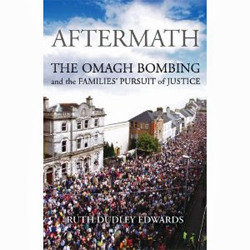
The Omagh bomb was the worst massacre in Northern Ireland’s modern history – yet from it came a most extraordinary tale of human resilience, as families of murdered people channelled their grief into action. As the bombers congratulated themselves on escaping justice, the families determined on a civil case against them and their organisation. No one had ever done this before. It was a very domestic atrocity. In Omagh, on Saturday, 15 August 1998, a massive bomb placed by the so-called Real IRA murdered unborn twins, six men, twelve women and eleven children, of whom two were Spanish and one English: the dead included Protestants, Catholics and a Mormon. Although the police believed they knew the identities of the killers, there was insufficient evidence to bring charges. Taking as their motto ‘For evil to triumph, all that is necessary is for good men to do nothing’, families of ten of the dead decided to pursue these men through the civil courts, where the burden of proof is lower. This is the remarkable account of how these families – who had no knowledge of the law and no money, and included a cleaner, a mechanic and a bookie – became internationally recognised, formidable campaigners and surmounted countless daunting obstacles to win a famous victory. How these mothers and fathers and sisters and brothers turned themselves into the scourge of the Real IRA is not just an astonishing story in itself. It is also a universal story of David challenging Goliath, as well as an inspiration to ordinary people anywhere devastated by terrorism.
Posted on October 15, 2010 by The Orwell Prize -
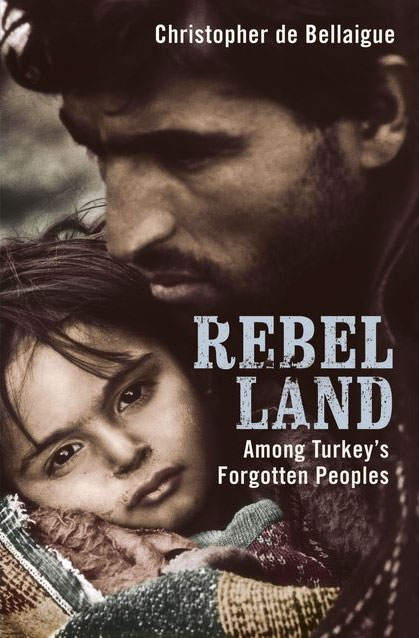
What is the meaning of love and death in a remote, forgotten, impossibly conflicted part of the world? In Rebel Land the acclaimed author and journalist Christopher de Bellaigue journeys to Turkey’s inhospitable eastern provinces to find out. Immersing himself in the achingly beautiful district of Varto, a place left behind in Turkey’s march to modernity, medieval in its attachment to race and religious sect, he explores the violent history of conflict between Turks, Kurds and Armenians, and the maelstrom, of emotion and memories, that defines its inhabitants even today. The result is a compellingly personal account of one man’s search into the past, as de Bellaigue, mistrusted by all he meets, and particularly by the secret agents of the State, applies his investigative flair and fluent Turkish to unlock jealously-guarded taboos and hold humanity’s excesses up to the light of a very modern sensibility.
Posted on October 15, 2010 by The Orwell Prize -
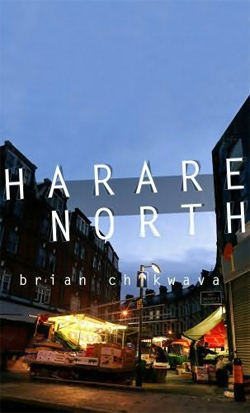
When he lands in Harare North, our unnamed protagonist carries nothing but a cardboard suitcase full of memories and an email address for his childhood friend, Shingi.Finessing his way through immigration, he spends a few restless weeks as the very unwelcome guest in his cousin’s home before tracking down Shingi in a Brixton squat. In this astonishing, revelatory original debut, Caine Prize winner Brian Chikwava tackles head-on the realities of life as a refugee.This is the story of a stranger in a strange land – one of the thousands of illegal Zimbabwean immigrants seeking a better life in England – with a past he is determined to hide.From the first line the language fizzes with energy, humour and not a little menace.As he struggles to make his life in London (the ‘Harare North’ of the title) and battles with the weight of what he has left behind in a strife-torn Zimbabwe, every expectation and preconception (both his and ours) is turned on its head.The inhabitants of the squat function at various levels of desperation: Shingi struggles to find meaningful work and to meet the demands of his family back home; Tsitsi makes a living renting out her baby to women defrauding Social Services; Alex claims to have an important job in Croydon. Fearlessly political, laugh-out-loud funny and with an anti-hero whose voice is impossible to forget, Chikwava’s novel is an arresting account of London as it is experienced by the Africa’s dispossessed.
Posted on October 15, 2010 by The Orwell Prize -

Selected writings from one of the most important commentators of our generation covering the wreckage of Labour’s 10 year love affair with the Right. By the summer of 2007, Britain was close to crashing. A few onlookers realised the danger, but Britain’s political leaders were not among them. Politicians and civil servants boasted that the City’s economy was booming because of their ‘light-touch regulation’ of workers in financial services whose number included potential frauds. Curiously, they never argued that the inner-city economy might boom if there was ‘light touch regulation’ of workers in the ghettos whose number included potential drug dealers. And artists produced works to match the times. On the same day that Lehman Brothers went bankrupt, the genial Damien Hirst auctioned at Sotheby’s pieces he admitted had been mass produced in his studios and buyers still gave him £100 million. Even the critics did not pretend to be interested in what message, if any, Hirst had for his audience, but reported the sale like business reporters covering a soaring stock. For 10 years New Labour stood cross-eyed in admiration as London was turned into the centre of the financial universe. From the sand bags Nick Cohen has watched as they turned their back on the working class, once the object of Utopian hopes on the Left and unreasonable fears on the Right, and lovingly embraced the upper class, once the object of surly contempt on the Left. In Waiting for the Etonians are gathered his selected writings that cover the span of Labour’s love affair with the Right and the moral hazard that it has culminated in. It is a romance which has not only broken its traditional bond with the working classes and undermined the very values on which the party was founded, but has now left it with little more to do than warm the seat for the next Conservative Prime Minister.
Posted on October 15, 2010 by Eric Blair -
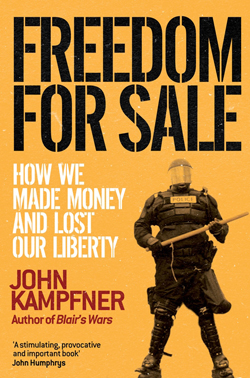
Why do so many people around the world appear willing to give up freedoms in return for security or prosperity? For the past 60 years it had been assumed that capitalism was intertwined with liberal democracy. But what happens when both are undermined? Governments globally have drawn up a new pact with their peoples: repression is confined to the few who openly challenge the status quo. The rest of the population can enjoy freedom to live more or less as they wish, and to make and spend their money. This is the difference between public freedoms and private freedoms. We choose different freedoms we are prepared to cede. We all do it. Freedom for Sale will set a new agenda. It will crucially ask why so many intelligent and ambitious citizens around the world seemed prepared to sacrifice freedom of the press and freedom of speech in their quest for wealth.
Posted on October 15, 2010 by Eric Blair -

On the eve of the twentieth anniversary of the Rushdie fatwa, From Fatwa to Jihad tells, for the first time, the full story of this defining episode and explores its repercussions and resonance through to contemporary debates about Islam, terrorism, free speech and Western values. When a thousand Muslim protestors paraded through a British town with a copy of Salman Rushdie’s The Satanic Verses before ceremoniously burning the book, it was an act motivated by anger and offence as well as one calculated to shock and offend. It did more than that: the image of the burning book became an icon of the Muslim anger. Sent around the globe by photographers and TV cameras, the image announced a new world. Twenty years later, the questions raised by the Rushdie affair – Islam’s relationship to the West, the meaning of multiculturalism, the limits of tolerance in a liberal society – have become some of the defining issues of our time. Taking the Ayatollah Khomeini’s fatwa as his starting point, Kenan Malik examines how radical Islamhas gained hold in Muslim communities,how multiculturalism contributed to this, and how the Rushdie affair transformed the very nature of the debate on tolerance and free speech.
Posted on October 15, 2010 by The Orwell Prize -

Individual liberty will be the defining issue of the twenty-first century. With fear of terrorism, crime and social chaos putting our ideals of it into retreat in recent years, how do we, as individuals, negotiate the maximum amount of freedom in such a complex world? How can we resist the growth of intrusive authoritarianism without exposing ourselves to those risks? History provides a guide to answering these questions. In What Price Liberty? Ben Wilson travels through four centuries of British, American and European history, elaborating not just how civil liberties were constructed in the past, but how they were continually re-thought – and re-fought – in response to modernity. The last chapters put into context the controversies of the last decade or so – the threat of terrorism and the rise of the database nation. If liberty is to survive now it must, like it did in the past, adapt to new circumstances. But to do this we need to agree about the value we place on it. Ben Wilson is the author of The Laughter of Triumph: William Hone and the Fight for the Free Press, Decency and Disorder: The Age of Cant 1789-1837 and has been cited by the Irish Times as ‘one of the rising stars of historical writing’.
Posted on October 15, 2010 by The Orwell Prize -
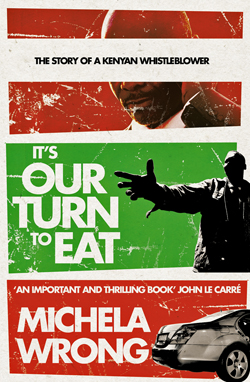
A gripping account of both an individual caught on the horns of an excruciating moral dilemma and a continent at a turning point. When Michela Wrong’s Kenyan friend John Githongo appeared one cold February morning on the doorstep of her London flat, carrying a small mountain of luggage, it was clear something had gone very wrong in a country regarded until then as one of Africa’s few budding success stories. Two years earlier, in the wave of euphoria that followed the election defeat of long-serving President Daniel arap Moi, John had been appointed Kenya’s new anti-corruption czar. In choosing this giant of a man, respected as a longstanding anti-corruption crusader, the new government was signalling that it was set on ending the practices that had made Kenya an international by-word for sleaze. Now John was on the run, having realised that the new administration, far from breaking with the past, was using near-identical techniques to pilfer public funds. John’s tale, which has all the elements of a political thriller, is the story of how a brave man came to make a lonely decision with huge ramifications. But his story transcends the personal, touching as it does on the cultural, historical and social themes that lie at the heart of the continent’s continuing crisis. Tracking this story of an African whistleblower, Michela Wrong seeks answers to the questions that have puzzled outsiders for decades. What is it about African society that makes corruption so hard to eradicate, so sweeping in its scope, so destructive in its impact? Why have so many African presidents found it so easy to reduce all political discussion to the self-serving calculation of which tribe gets to ‘eat’? And at what stage will Africans start placing the wider interests of their nation ahead of the narrow interests of their tribe?
Posted on October 15, 2010 by The Orwell Prize -
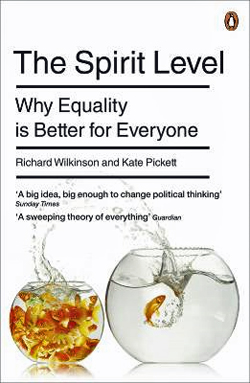
It is common knowledge that in rich societies the poor have shorter lives and suffer more from almost every social problem. Large inequalities of income are likewise often regarded as divisive and corrosive. This groundbreaking book, based on thirty years’ research, goes an important stage beyond either of these ideas: it demonstrates that more unequal societies are bad for almost everyone within them – the well-off as well as the poor. The remarkable data the book lays out and the measures it uses are like a spirit level which we can hold up to compare the conditions of different societies. The differences revealed, even between rich market democracies, are striking. Almost every modern social and environmental problem – ill-health, lack of community life, violence, drugs, obesity, mental illness, long working hours, big prison populations – is more likely to occur in a less equal society. The Spirit Level goes to the heart of the apparent contrast between the material success and social failings of many modern societies, but it does not simply provide a key to diagnosing our ills. It tells us how to shift the balance from self-interested ‘consumerism’ to a friendlier and more collaborative society. It shows a way out of the social and environmental problems which beset us and opens up a major new approach to improving the real quality of life, not just for the poor but for everyone. It is, in its conclusion, an optimistic book, which should revitalise politics and provide a new way of thinking about how we organise human communities.
Posted on October 15, 2010 by The Orwell Prize -
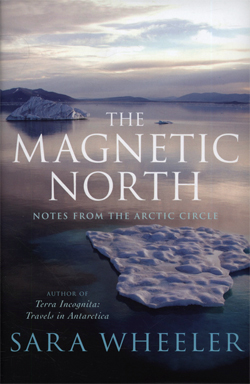
Smashing through the Arctic Ocean with the crew of a Russian icebreaker, herding reindeer across the tundra with Lapps and shadowing the Trans-Alaskan pipeline with truckers, Sara Wheeler uncovers the beautiful, brutal reality of the Arctic. When she puts up her tent on the top of the Greenland ice sheet, she experiences climate change at the sharp (and cold) end. The Magnetic North is a spicy confection of history, science and reflection in which Wheeler meditates on the role of the Arctic in public and in private. The fragmented circumpolar lands were a repository of myth long before the scientists and oilmen showed up (not to mention desperado explorers who ate their own shoes), and the hinterland north of the tree line has fed literary imaginations from Dickens to Chekhov. The Magnetic North tells of all this, plus gulag ghosts, old and new Russia, colliding cultures and bioaccumulated toxins in polar bears. The unowned homogeneity of the Antarctic that enchanted the youthful author in the bestselling Terra Incognita finally finds a counterpart in the embattled polar lands at the other end of the earth. The complex and ambiguous Arctic, Wheeler writes, ‘perfectly captures the elegiac melancholy of middle age.’
Posted on October 15, 2010 by The Orwell Prize -

Nigeria is a country where petroleum prices and polio are both booming, where small villages challenge giant oil companies, and scooter drivers run their own mini-state. The oil-rich Delta region at the heart of it all is, as Peel shows us, a troublespot as hot as the local pepper soup. Through a host of characters, from the prostitutes of Port Harcourt to the Area Boys of Lagos, from the militants in their swamp forest hide-outs to the oil company executives in London, Peel tells the story of this extraordinary country, which grows ever more wild and lawless by the day as its crude oil pumps through our cities.
Posted on October 15, 2010 by The Orwell Prize -

Between 1995 and 2007, the Republic of Ireland was the worldwide model of successful adaptation to economic globalisation. The success story was phenomenal: a doubling of the workforce; a massive growth in exports; a GDP that was substantially above the EU average. Ireland became the world’s largest exporter of software and manufactured the world’s supply of Viagra. The factors that made it possible for Ireland to become prosperous – progressive social change, solidarity, major State investment in education, and the critical role of the EU – were largely ignored as too sharply at odds with the dominant free market ideology. The Irish boom was shaped instead into a simplistic moral tale of the little country that discovered low taxes and small government and prospered as a result. There were two big problems. Ireland acquired a hyper-capitalist economy on the back of a corrupt, dysfunctional political system. And the business class saw the influx of wealth as an opportunity to make money out of property. Aided by corrupt planning and funded by poorly regulated banks, an unsustainable property-led boom gradually consumed the Celtic Tiger. This is, as Fintan O’Toole writes, ‘a good old-fashioned jeremiad about the bastards who got us into this mess’. It is an entertaining, passionate story of one of the most ignominious economic reversals in recent history.
Posted on October 15, 2010 by The Orwell Prize -

Vesna Maric left Bosnia the beginning of the war, at the age of sixteen, on a convoy of coaches carrying refugees to Penrith in the north of England. Bluebird is Vesna’s funny, vivid and immensely readable memoir of the experience, from the beginning of the war through to her eventual return to Bosnia years later. Unlike many books on Bosnia, and refugees in general, Bluebird is never self-pitying, never grave. It’s refreshing to read an account of these experiences filtered through the eyes of a teenager with attitude – written with brilliant comic timing and a great storytelling gift.
Posted on October 15, 2010 by The Orwell Prize -

Friedrich Engels is one of the most attractive and contradictory figures of the nineteenth century. Born to a prosperous mercantile family in west Germany, he spent his career working in the Manchester cotton industry, riding to the Cheshire hounds, and enjoying the comfortable, middle-class life of a Victorian gentleman. Yet Engels was also the co-founder of international communism – the philosophy which in the 20th century came to control one third of the human race. He was the co-author of The Communist Manifesto, a ruthless party tactician, and the man who sacrificed his best years so Karl Marx could write Das Kapital. Tristram Hunt relishes the diversity and exuberance of Engels’s era: how one of the great bon viveurs of Victorian Britain reconciled his raucous personal life with this uncompromising political philosophy.
Posted on October 14, 2010 by The Orwell Prize -

The seventies are probably the most important and fascinating period in modern British political history. They encompass strikes that brought down governments, shock general election results, the rise of Margaret Thatcher and the fall of Edward Heath, the IMF crisis, the Winter of Discontent and the three-day week. But the seventies have also been frequently misunderstood, oversimplified and misrepresented. When the Lights Went Out goes in search of what really happened, what it felt like at the time, and where it was all leading. It includes vivid author interviews with many of the leading participants, many of them now dead, from Heath to Jack Jones to Arthur Scargill, and it travels from the once famous factories where the great industrial confrontations took place to the suburbs where Thatcherism was created and to remote North Sea oil rigs. The book also unearths the stories of the forgotten political actors away from Westminster who gave the decade so much of its volatility and excitement, from the Gay Liberation Front to the hippie anarchists of the free-festival movement. Over five years in the making, this book is not an academic history but something for the general reader, written with the vividness of a novel or the best works of American New Journalism. No such treatment of the seventies has been previously attempted. Hopefully the book will bring the decade back to life in its all its drama and complexity.
Posted on October 17, 2009 by Eric Blair -

From the 1960s to the 1980s, Sweden was an affluent, egalitarian country envied around the world. Refugees were welcomed, even misfit young Englishmen could find a place there.
Andrew Brown spent part of his childhood in Sweden during the 1960s. In the 1970s he married a Swedish woman and worked in a timber mill while helping to raise their small son. Fishing became his passion and his escape. In the mid-1980s his marriage and the country fell apart. The Prime Minister was assassinated. The welfare system crumbled along with the industries that had supported it. Twenty years later, Andrew Brown travelled the length of Sweden in search of the country he had loved, and then hated, and now found he loved again.
Posted on October 18, 2008 by The Orwell Prize -

From the much-loved, witty and excoriating voice of journalist Nick Cohen, a powerful and irreverent dissection of the agonies, idiocies and compromises of mainstream liberal thought. Nick Cohen comes from the Left. While growing up, his mother would search the supermarket shelves for politically reputable citrus fruit and despair. When, at the age of 13, he found out that his kind and thoughtful English teacher voted Conservative, he nearly fell off his chair: ‘To be good, you had to be on the Left.’ Today he’s no less confused. When he looks around him, in the aftermath of the invasion of Iraq, he sees a community of Left-leaning liberals standing on their heads. Why is it that apologies for a militant Islam that stands for everything the liberal-Left is against come from a section of the Left? After the American and British wars in Bosnia and Kosovo against Slobodan Milosevic’s ethnic cleansers, why were men and women of the Left denying the existence of Serb concentration camps? Why is Palestine a cause for the liberal-Left, but not, for instance, China, the Sudan, Zimbabwe or North Korea? Why can’t those who say they support the Palestinian cause tell you what type of Palestine they would like to see? After the 9/11 attacks on New York and Washington why were you as likely to read that a sinister conspiracy of Jews controlled American or British foreign policy in a liberal literary journal as in a neo-Nazi rag? It’s easy to know what the Left is fighting against – the evils of Bush and corporations – but what and, more to the point, who are they fighting for? As he tours the follies of the Left, Nick Cohen asks us to reconsider what it means to be liberal in this confused and topsy-turvy time. With the angry satire of Swift, he reclaims the values of democracy and solidarity that united the movement against fascism, and asks: What’s Left?
From the much-loved, witty and excoriating voice of journalist Nick Cohen, a powerful and irreverent dissection of the agonies, idiocies and compromises of mainstream liberal thought. Nick Cohen comes from the Left. While growing up, his mother would search the supermarket shelves for politically reputable citrus fruit and despair. When, at the age of 13, he found out that his kind and thoughtful English teacher voted Conservative, he nearly fell off his chair: ‘To be good, you had to be on the Left.’ Today he’s no less confused. When he looks around him, in the aftermath of the invasion of Iraq, he sees a community of Left-leaning liberals standing on their heads. Why is it that apologies for a militant Islam that stands for everything the liberal-Left is against come from a section of the Left? After the American and British wars in Bosnia and Kosovo against Slobodan Milosevic’s ethnic cleansers, why were men and women of the Left denying the existence of Serb concentration camps? Why is Palestine a cause for the liberal-Left, but not, for instance, China, the Sudan, Zimbabwe or North Korea? Why can’t those who say they support the Palestinian cause tell you what type of Palestine they would like to see? After the 9/11 attacks on New York and Washington why were you as likely to read that a sinister conspiracy of Jews controlled American or British foreign policy in a liberal literary journal as in a neo-Nazi rag? It’s easy to know what the Left is fighting against – the evils of Bush and corporations – but what and, more to the point, who are they fighting for? As he tours the follies of the Left, Nick Cohen asks us to reconsider what it means to be liberal in this confused and topsy-turvy time. With the angry satire of Swift, he reclaims the values of democracy and solidarity that united the movement against fascism, and asks: What’s Left?

















